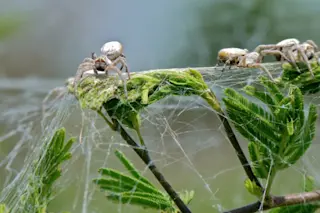Stegodyphus dumicola spiders. (Credit: Wikimedia Commons) A bold or aggressive person can change the dynamic of a group. That happens in spider colonies, too. In a study published this week in Proceedings of the Royal Society B, researchers show that bold spiders can change the behavior of other spiders. The meek spiders start copying the behavior, something that can both help and potentially harm the colony.
Researchers collected colonies of Stegodyphus dumicola in South Africa. They created 24 of their own spider colonies consisting of 10 females each (males were not used because they are short-lived and rare, making up only 12 percent of the population, the study says). The colonies were observed for six and a half weeks. The study also used a statistical model to crunch data. Boldness was measured not by calculating a spider’s quick action in snagging prey, though that was an outcome of boldness. Rather ...














